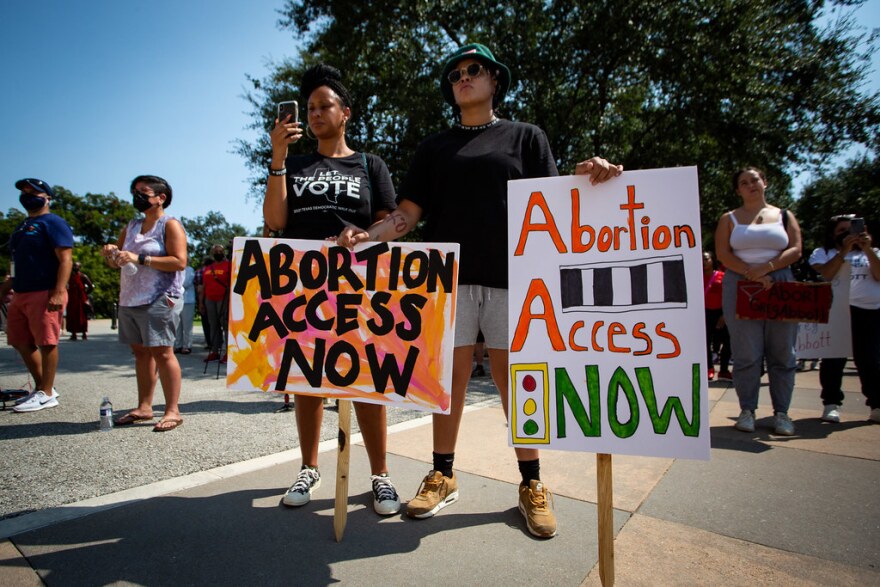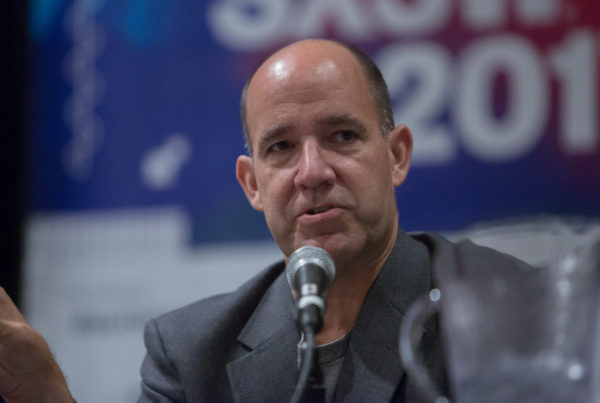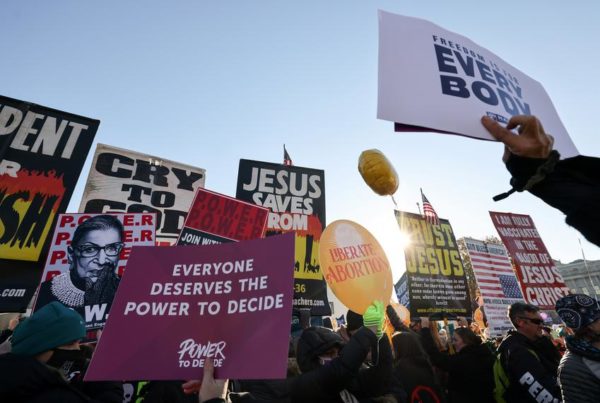Listen above for our interview with two legal experts about the court’s rulings, or read the transcript, following this news story.
From KUT:
The U.S. Supreme Court ruled Friday that abortion providers can continue their legal challenges to a Texas law that prohibits abortions as early as six weeks into a pregnancy.
The court also dismissed a lawsuit filed by the U.S. Department of Justice that sought to block the law, arguing it was in direct violation Roe v. Wade, the legal precedent that made abortion legal in the U.S. up to 24 weeks into a pregnancy.
Abortion providers’ legal challenges have faced hurdles because of the way state lawmakers wrote the law, known as Senate Bill 8.
“The Court holds that the petitioners may bring a pre-enforcement challenge in federal court as one means to test S. B. 8’s compliance with the Federal Constitution,” the court wrote. “Other pre-enforcement challenges are possible too; one such case is ongoing in state court in which the plaintiffs have raised both federal and state constitutional claims against S. B. 8.”
Amy Hagstrom Miller, president and CEO of Whole Woman’s Health — the lead plaintiff in the case — said in a statement that the decision means there is “hope for an end to this horrific abortion ban” that has been in effect for more than 100 days now.
“The legal back and forth has been excruciating for our patients and gut-wrenching for our staff,” she said. “We’ve had to turn hundreds of patients away since this ban took effect, and the Supreme Court’s refusal to block the law means the heartbreak doesn’t end. Texans deserve abortion care in their own communities.”
Kimberlyn Schwartz, the director of media and communication for Texas Right to Life, said in a statement that her group was “grateful” the court didn’t side with the U.S. Justice Department and kept the law in effect as the legal challenges move forward.
“While we continue to fight for this policy in the lower courts, Texas Right to Life celebrates that the Texas Heartbeat Act will continue saving between 75-100 preborn children from abortion per day,” she said. “The success of our efforts is embodied by each individual life that is rescued.”
Texas’ law, which has been in effect since Sept. 1, is the strictest ban on the procedure in the country.
Even though it runs afoul of Roe v. Wade , Texas has been able to keep SB 1 in place because of its enforcement mechanism. Instead of state agencies enforcing the ban, lawmakers drafted it to be enforced by private citizens.
Anyone, including people outside Texas, can sue someone who provides an abortion to someone past that six-week limit. They can also sue anyone who helps someone get an abortion, which could include family members, counselors and even rideshare drivers.
This setup, which a federal judge described as a “scheme,” has made it difficult for abortion providers and others to figure out how to sue to stop the law.
As a result, clinics across the state have been turning away hundreds of patients seeking abortions; many people don’t realize they’re pregnant until after six weeks into a pregnancy.
In her opinion, Justice Sonia Sotomayor wrote that since SB 8 went into effect “the law has threatened abortion care providers with the prospect of essentially unlimited suits for damages” brought by “bounty hunters” from around the country.
“The chilling effect has been near total, depriving pregnant women in Texas of virtually all opportunity to seek abortion care within their home State after their sixth week of pregnancy,” she wrote.
According to a recent study from the Texas Policy Evaluation Project at UT Austin, nearly 50% fewer abortions were provided in Texas in September — the first month the law was in effect — compared to a year ago.
Marva Sadler, the senior director of critical services for Whole Woman’s Health, told KUT this week that the four clinics her group operates have been serving about 30% of their usual number of patients.
She said there have already been financial ramifications.
“We are losing staff, we are losing providers, we are losing patients,” Sadler said. “We are definitely seeing the hurt of it for sure.”
The biggest impact, however, will be on the people who are forced to continue a pregnancy, Sadler said, because they didn’t have the means or resources to leave the state to get an abortion.
“In nine months there are going to be a lot of unwanted pregnancies coming to term,” she said. “I wonder what the preparation and the plans are for the plethora of children who will be born in the next nine to 10 months who are unwanted, unsupported — and have parents who don’t have the financial, mental or physical means to take care of them.”
In his opinion, Chief Justice John Roberts wrote that “Texas was wrong” in claiming that plaintiffs couldn’t sue to stop the law from going into effect — and that plaintiffs should be able to challenge it now.
“Given the ongoing chilling effect of the state law, the District Court should resolve this litigation and enter appropriate relief without delay,” he wrote.
















